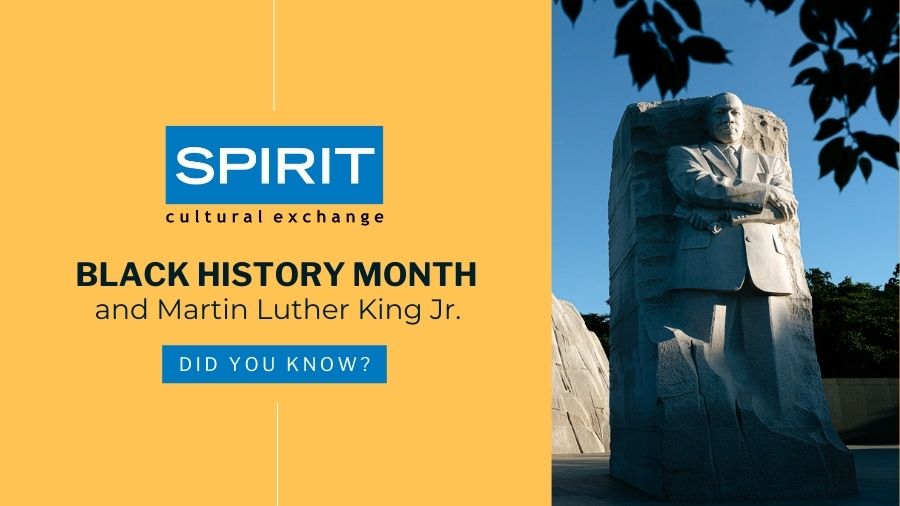National Black History Month is an occasion that celebrates the contribution of so many Americans who have indelibly shaped our nation’s history. You can find many institutions that are celebrating Black History Month. Spirit Cultural Exchange honors these transformative leaders with a closer look at the contributions of Black History Month and Dr. Martin Luther King Jr.
Champion of Intercultural Understanding: Martin Luther King Jr.
Dr. Martin Luther King Jr. is widely known for his leadership in the civil rights movement, but his contributions go far beyond the fight for racial equality. As a passionate advocate for intercultural understanding, Martin Luther King Jr. believed that justice and peace could only be achieved through unity among all people, regardless of their background or identity. His work and legacy continue to inspire efforts toward a more inclusive and compassionate world.
Promoting Intercultural Dialogue
One of Dr. King’s most important accomplishments was his ability to engage with people from different backgrounds, both within the United States and abroad. He believed that dialogue between different cultures was essential for fostering mutual understanding and respect. Dr. King’s travels abroad, especially to places like India, where he studied Mahatma Gandhi’s philosophy of nonviolence, helped him refine his vision of a more interconnected, peaceful world. This global perspective enriched his efforts to create intercultural dialogue at home, where he worked with various religious and ethnic groups to advocate for social justice.
A Vision for Unity
Dr. King’s philosophy of nonviolent resistance emphasized love and understanding over hatred and division. He understood that true progress could only occur when people of all races, cultures, and religions came together to create a society that values equality, respect, and justice for everyone. His speeches often touched on the importance of working together, regardless of one’s differences. In his famous “I Have a Dream” speech, Dr. King expressed his vision of a nation where people would be judged by the content of their character, not the color of their skin.

International Influence
Dr. King’s impact wasn’t confined to the United States. His philosophy of peace and understanding crossed borders and inspired leaders and movements around the world. In the 1960s, he met with prominent figures like Nelson Mandela, who praised Dr. King for his unwavering commitment to justice and equality. King’s influence was felt by other movements for independence and equality, particularly in countries that were fighting against oppression and colonial rule. His work is still celebrated worldwide, with numerous streets, schools, and organizations named in his honor in countries across the globe. His leadership during the American civil rights movement became a model for others working toward social justice and intercultural understanding.
In 1964, Dr. King received the Nobel Peace Prize for his efforts to advance civil rights using nonviolent methods. His acceptance speech, delivered in Norway, emphasized the importance of global cooperation and understanding, echoing his belief that the struggle for justice in one part of the world affects all of humanity.

Black History Month and Martin Luther King Jr.’s Lasting Legacy
Thanks to his dedication to intercultural understanding, Martin Luther King Jr. bridged cultural divides continues to influence leaders and activists who are working to break down barriers of prejudice and discrimination. His unwavering belief in the power of love, compassion, and nonviolence as tools for change resonates in many contemporary social justice movements. As we reflect on the remarkable achievements of Dr. Martin Luther King Jr., we are reminded of his words: “We may have all come on different ships, but we’re in the same boat now.” His vision of unity, justice, and peace is more relevant today than ever, serving as a beacon of hope for a world that continues to seek intercultural understanding and global cooperation.
Interested in Exchange Programs in the United States?
BridgeUSA programs help inform current and future international leaders’ perspective on American culture and its people. Spirit Cultural Exchange offers a variety of BridgeUSA J-1 visa exchange programs to international university students, recent graduates, young professionals and teachers from around the world who want to experience life in the United States.

